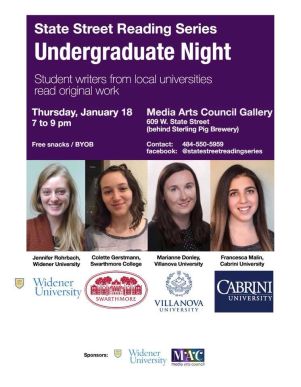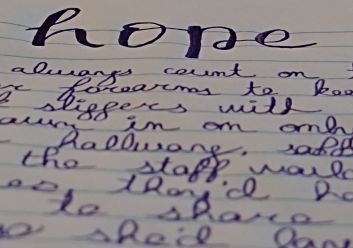“I could always count on the girl with carvings down her forearms to keep me up at night. She wore black slippers with red polkadots, sad faces drawn in on only a few of them. She’d pace the hallway, sobbing— screaming.”
-An excerpt from Francesca Maslin’s “Hope.”
Francesca Maslin, sophomore writing major, represented Cabrini University at the State Street Reading Series Undergraduate Night on Jan. 18.

The event featured the original, fictional work of student writers from Cabrini, Widener University, Swarthmore College and Villanova University and was sponsored by Widener University and the Media Arts Council.
Being selected to read is an honor because only one student writer is selected from each school. Associate professor of English Dr. Amy Persichetti selected Maslin to represent the university at the State Street Reading Series because of her ability to take risks in her writing.
Persichetti said, “Francesca’s work was chosen because she is an excellent writer; however, what sets her apart is her ability to measure risks and write truthfully about experiences many people may have had but don’t speak about. I admire her as a writer. She has a strong ability that should be celebrated.”
Maslin read her short story “Hope,” which is a fictional piece based on her own time in an institution a couple years ago. “Hope” was written after she was prompted to write a fictional short story for class.
Like many of her poems, pros and lyrics, this story was loosely-inspired by her life; however, Maslin finds inspiration in other places.
“Mostly I write from experience but, I don’t know, it kind of just comes within,” Maslin said. “I like to base it off my surroundings sometimes.”
The story “Hope” is about a professed-psychotic narrator’s experience spending a week in what she felt was a prison-like mental health institution separated from time.
“Writing is definitely one of the many ways that I kind of cope with everything that’s thrown at me,” Maslin said. “I use it to overcome the challenges that I face.”
The short story’s use of language is striking and the topic is daring and risky.
She hopes that the people who listen to the story takeaway a better understanding of the significance their actions have on others.

Maslin said she wants the audience “to be more aware of how impactful what you say and do can be on people. Just be aware. Be observant. And just be kind.”
The writer and lyricist has a deep appreciation for writing and recognizes that art— from both the perspectives of a creator and as an audience member— can be a great outlet for emotional expression.
“I think it’s a good outlet for people,” Maslin said. “I feel like a lot of times, we can’t communicate how we feel, so being able to do that through forms of media— art or writing or song or whatever the case is— I feel like that’s a good outlet for people because you kind of keep that inside and it builds up. It can be unhealthy.”
Maslin encourages individuals to look past the stigma of art being boring and to find art that resonates with them.
Maslin said, “Because we are forced to read, as we grow up, Shakespeare and all the boring stuff that no one wants to read, when we get at the collegiate level and we look at poetry and prose and it starts to be something more than just a Shakespeare piece and something meaningful to individuals, I feel as though they don’t want to look at it, because they already have this preconceived notion that they’re not going to like it. I would just say give it a chance. Not everything is the same. Poetry is so broad. There are so many different things that can be said about it. It’s just about finding what interests you the most and looking into that.”
Persichetti added that art is importance to individuals and to the human experience itself.
“Without art, especially without writing, we would be machines,” Persichetti said. “There is more to the world than earning money. The arts allow you to fully participate in the human experience so that someone might read what you’ve written and understand their own experiences better. The arts keep us human; they teach us to find what is meaningful and powerful about the human experience.”
“The morning of my departure, my father came to pick me up… I passed by stains on the carpet as I approached the exit of the girls’ unit. I did not think much of it until I approached the door and noticed two people crying outside, talking to police officers. They broke down, screaming about their daughter. The mother kept yelling, ‘Hope! Hope!’ I watched her fall to the ground and recognized the pair of slippers in her hand. Black with red polkadots, sad faces drawn in on only a few of them.”



